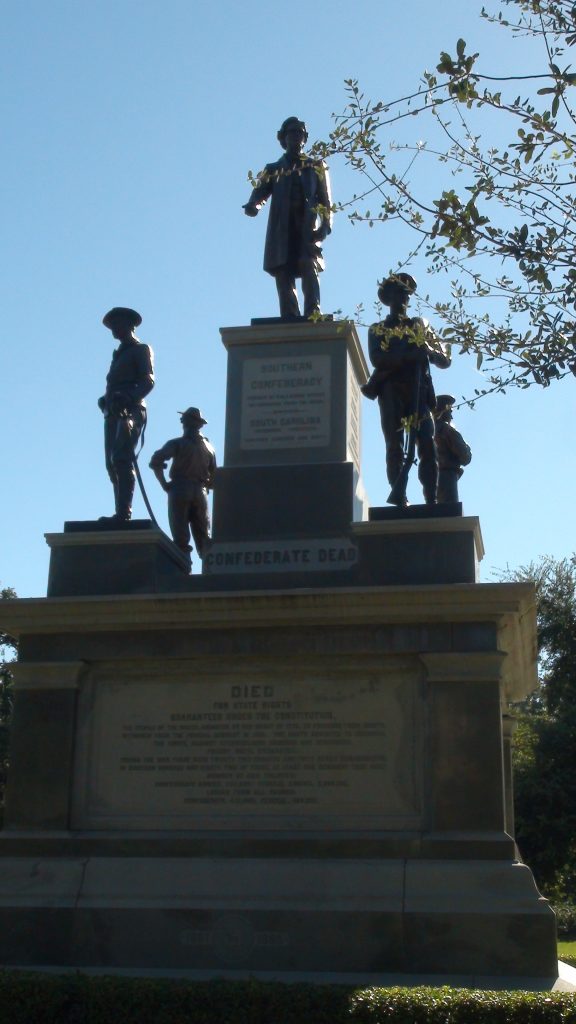Southern Confederacy, South Carolina Memorial. Austin, Texas.
Sunday, 8 May 2022
saying, ‘I am the God of your fathers—the God of Abraham, the God of Isaac, and the God of Jacob.’ And Moses trembled and dared not look. Acts 7:32
Note: You can listen to today’s commentary courtesy of our friends at “Bible in Ten” podcast. (Click Here to listen)
You can also read this commentary, with music, courtesy of our friends at “Discern the Bible” on YouTube. (Click Here to listen), or at Rumble (Click Here to listen).
In the previous verse, Moses had approached the burning bush. As he drew near, “the voice of the Lord came to him.” With that stated, it now says, “saying, ‘I am the God of your fathers.’” This would bring to remembrance the promises passed down among the Hebrew people that God had promised to deliver them.
Despite being raised among the Egyptians, it is likely that Moses was not only aware of his heritage, but also of what that heritage meant according to the stories kept in the collective mind of the people. Of note, the Hebrew text says, “I am the God of your father.”
The singular is taken by some to be a collective designation. However, it could just as likely mean that the Lord is referring to Amram, the father of Moses, ensuring that it is understood that the same God of his own father is the one who was also there all along with each generation that had passed. Stephen, however, focuses on the collective line by saying “fathers.”
With His words now introduced, the Lord continues, saying, “the God of Abraham, the God of Isaac, and the God of Jacob.” The words speak of the Lord’s transcendence over time. He is the God of Moses’ father and the same God who was worshipped by his ancestors, even 400 years earlier. Jesus uses this exact passage to make a theological point concerning the resurrection –
“But concerning the resurrection of the dead, have you not read what was spoken to you by God, saying, 32 ‘I am the God of Abraham, the God of Isaac, and the God of Jacob’? God is not the God of the dead, but of the living.” 33 And when the multitudes heard this, they were astonished at His teaching. Matthew 22:31-33
Stephen’s inclusion of these words, which would have been remembered by those who heard Jesus speak, provides suitable evidence that Jesus’ resurrection was not a mere fantasy, but something that has a precedent right from the words of Moses as recorded in Exodus. The Lord is the God of things that actually exist. If these fathers were alive to Him, even though they were dead to Moses, it means that the Lord is outside of time as we understand it, and He is in control of the state of His people in a way that we do not fully understand.
In Moses hearing these words issue from the burning bush that is not consumed, Stephen next says, “And Moses trembled and dared not look.”
The verb is an aorist participle, and it is united with an adjective. As such, it should read, “And Moses, having become terrified, dared not look.” The immensity of what he had seen and heard was beyond his ability to grasp. He was overwhelmed to the point that he could not raise his eyes to behold the sight before him.
Life application: The hope of the resurrection is no more impossible than the fact that there are fish in the ocean. God is not limited in what He can do, and He is fully capable of keeping every promise He has spoken forth.
If trials or loss have arisen in your life and you are wondering how God will work it all out, just remember the words of Jesus concerning the fathers. God has everything perfectly under control. We can, and should, absolutely trust that this is so. Demonstrate faith and be pleasing to God as you do.
Lord God Almighty, surely You are faithful to Your word. We can trust that Your plan will unfold exactly as You have stated. No fear here! We trust You to carry us through to the good land which You have promised to Your people. And may that day be soon, Lord! Amen.

